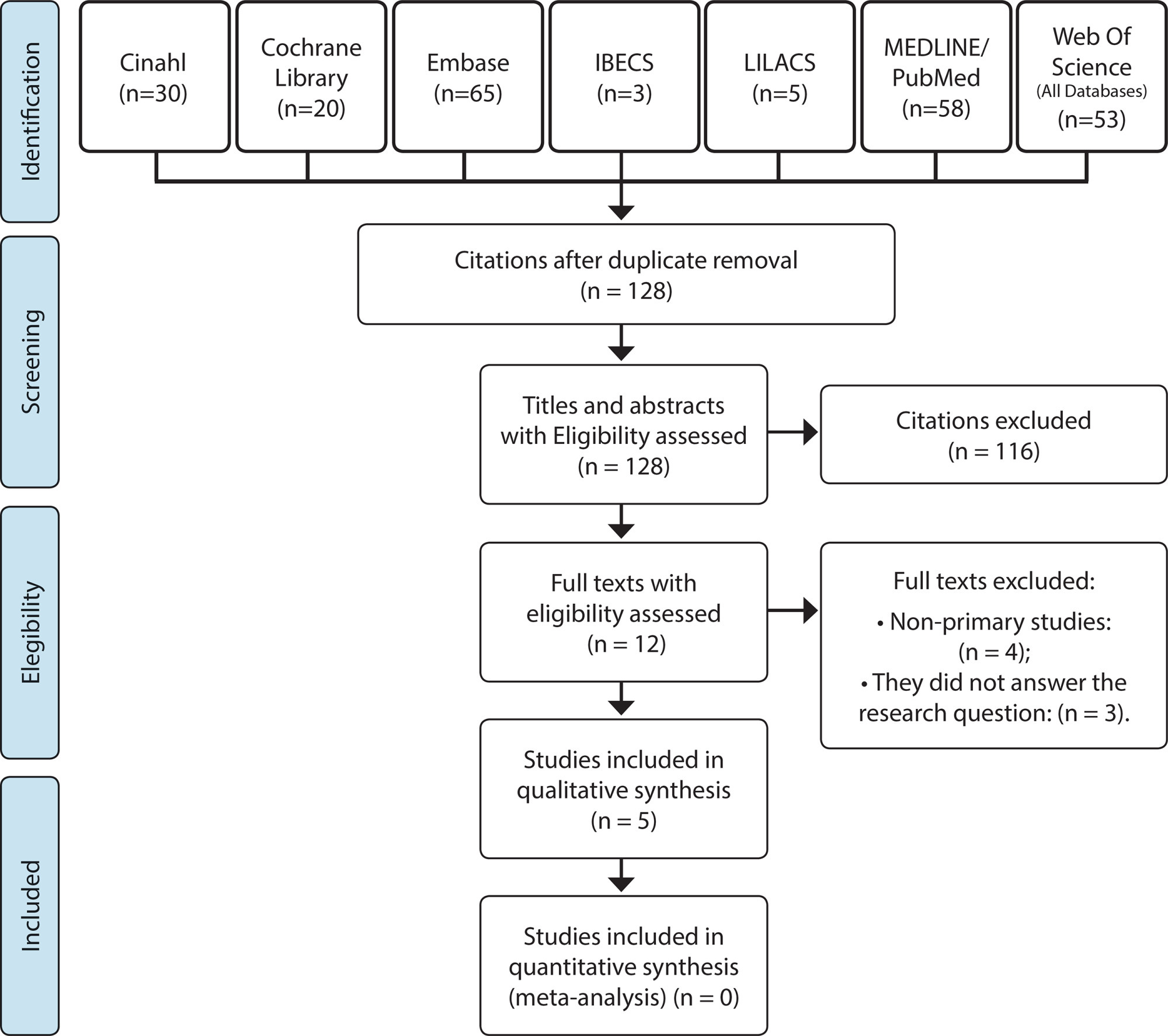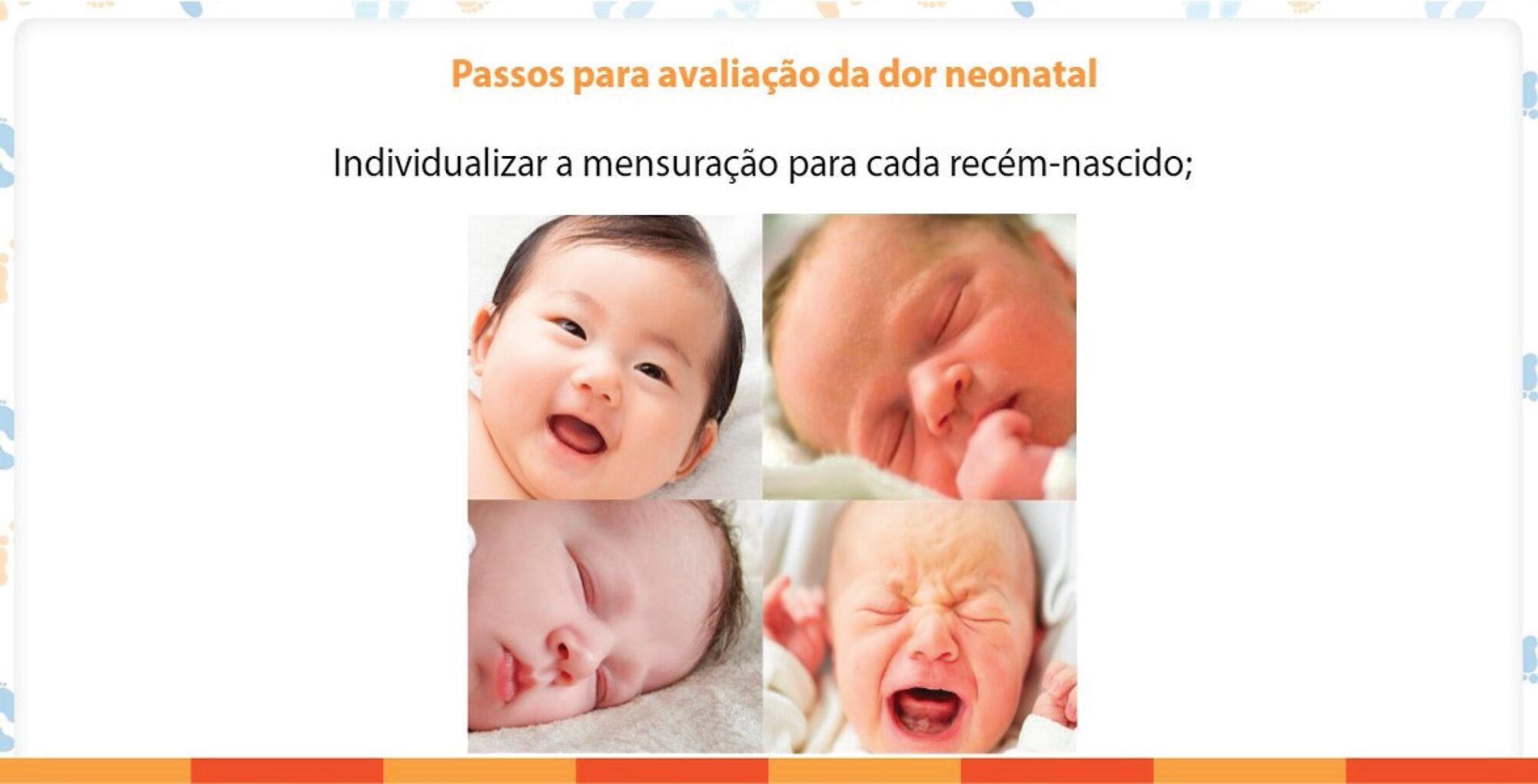-
10-17-2022
Campaña de Vacunación contra el COVID-19: Infodemia de Fake News
Revista Brasileira de Enfermagem. 2022;75(4):e750401
Abstract
Campaña de Vacunación contra el COVID-19: Infodemia de Fake News
Revista Brasileira de Enfermagem. 2022;75(4):e750401
DOI 10.1590/0034-7167.2022750401pt
Views0A globalização atingiu o século XXI na mesma sintonia e disseminação que as redes sociais, assemelhada ou correlata do mundo digital/virtual como fonte de informação e aconselhamento sobre a saúde pública brasileira e internacional. Logo, as pessoas contaminaram o processo de comunicação cibernético com diversas informações, verdadeiras e/ou falsas, provocando o que se denomina hodiernamente […]See more -
ORIGINAL ARTICLE10-17-2022
Support provided to nursing students in the face of patient safety incidents: a qualitative study
Revista Brasileira de Enfermagem. 2022;75(2):e20220009
Abstract
ORIGINAL ARTICLESupport provided to nursing students in the face of patient safety incidents: a qualitative study
Revista Brasileira de Enfermagem. 2022;75(2):e20220009
DOI 10.1590/0034-7167-2022-0009
Views0See moreABSTRACT
Objectives:
to identify the support provided to nursing students after a patient safety incident.
Methods:
qualitative study developed with 23 students attending an undergraduate nursing program in southern Brazil. Data were collected between September and November 2021 and submitted to textual discursive analysis using the Iramuteq software.
Results:
the students reported that mainly classmates and professors of the practical courses provided support. The students showed no knowledge of organizational support or protocols available to students who become second victims of such incidents.
Final Considerations:
the primary support sources available to nursing students involved in patient safety incidents were identified. Note that support provided to nursing students is still incipient both in Brazil and internationally. Hence, further studies are needed to address potential victims and support resources to mitigate this phenomenon.
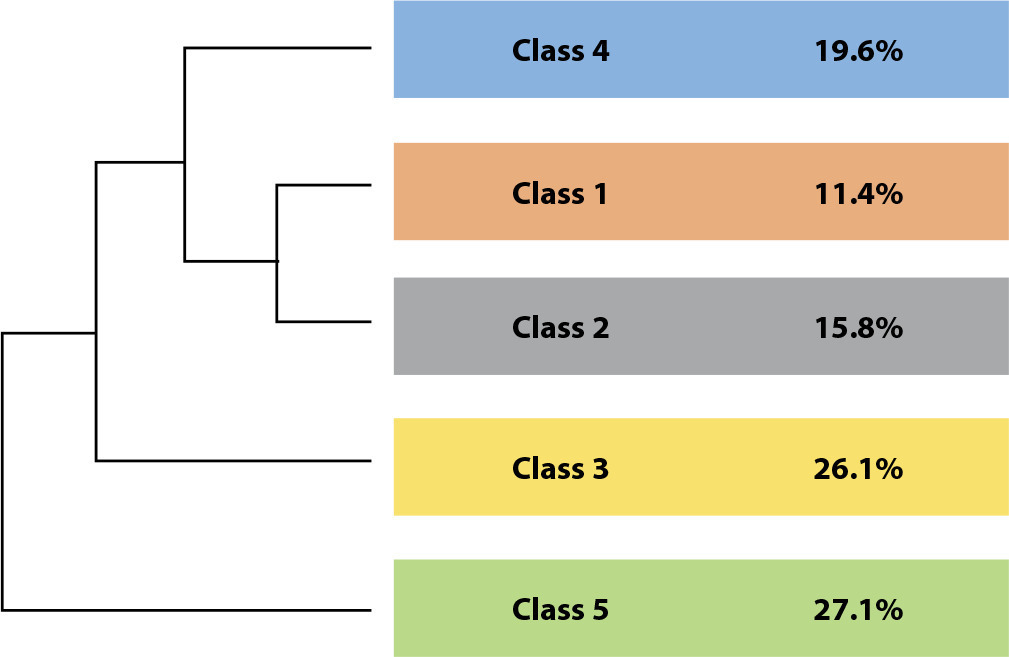
-
ORIGINAL ARTICLE10-17-2022
Supervision of the professional practice of nursing: case study describing the “on-site inspection” sub-process
Revista Brasileira de Enfermagem. 2022;75(2):e20210823
Abstract
ORIGINAL ARTICLESupervision of the professional practice of nursing: case study describing the “on-site inspection” sub-process
Revista Brasileira de Enfermagem. 2022;75(2):e20210823
DOI 10.1590/0034-7167-2021-0823
Views0See moreABSTRACT
Objectives:
to describe the “On-site inspection” sub-process of the macroprocess “Supervision” conducted at the headquarters unit of the Regional Nursing Council of São Paulo.
Methods:
an exploratory descriptive research, in a single case study modality using data reported by the Headquarters Unit Inspection Management leaders.
Results:
the description of the “On-Site inspection” sub-process, initial and return, showed how the activities/tasks pre-established in the inspection roadmap and inserted in the respective inspection terms need to be accurately and sequentially executed to comply with the current legislation and provided the identification of activities that add value to the inspection process.
Conclusions:
the results obtained give visibility to the activities/tasks developed by the inspectors and will provide the Inspection Management with subsidies for the rational allocation of the required human resources; and, to the technical managers and legal representatives of the inspected institutions, the knowledge of the activities developed during the performance of the sub-process “On-site inspection”.
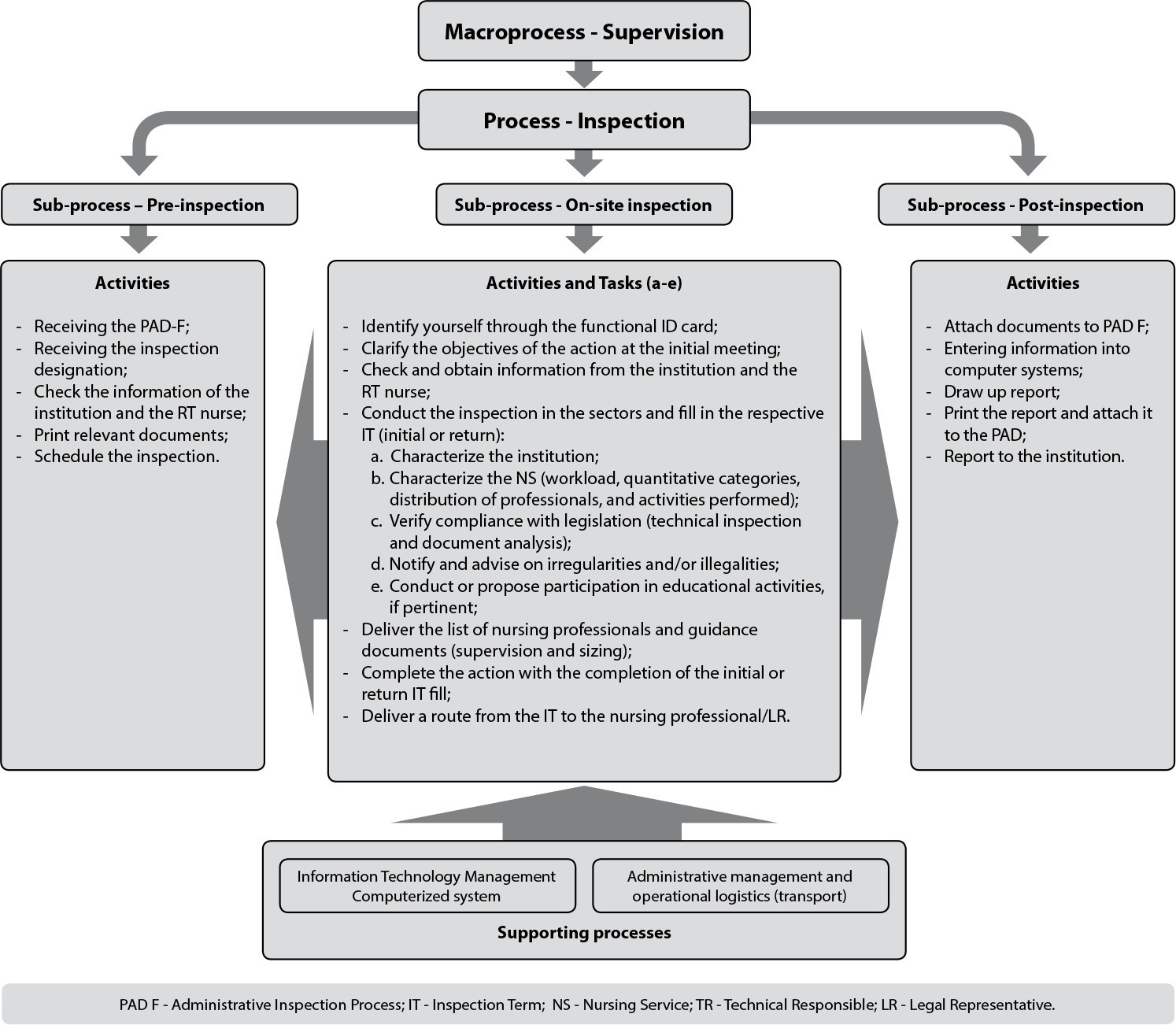
-
REVIEW10-17-2022
Authentic leadership in nurses’ professional practice: an integrative review
Revista Brasileira de Enfermagem. 2022;75(1):e20210972
Abstract
REVIEWAuthentic leadership in nurses’ professional practice: an integrative review
Revista Brasileira de Enfermagem. 2022;75(1):e20210972
DOI 10.1590/0034-7167-2021-0972
Views0See moreABSTRACT
Objectives:
to identify the primary constructs concerning authentic leadership and its relevance for nurses’ professional practice.
Methods:
integrative literature review conducted between 2015 and 2020 in LILACS, SciELO, and PubMed databases.
Results:
the United States published most of the 31 studies analyzed, with eight studies (25.8%), followed by Canada with seven studies (22.6%), and Brasil with five (16.1%). Most studies adopted a quantitative approach (77.41%), and 96.8% presented weak evidence. Three categories emerged: Work Engagement/Job Satisfaction and Organizational Commitment; Healthy Work Environment; and Intention to Quit the Job and Mental Exhaustion.
Final Considerations:
authentic leadership positively contributes to management and nursing care practice, promoting healthy work environments, structural empowerment, greater work engagement, and organizational commitment, decreasing absenteeism and mental exhaustion.
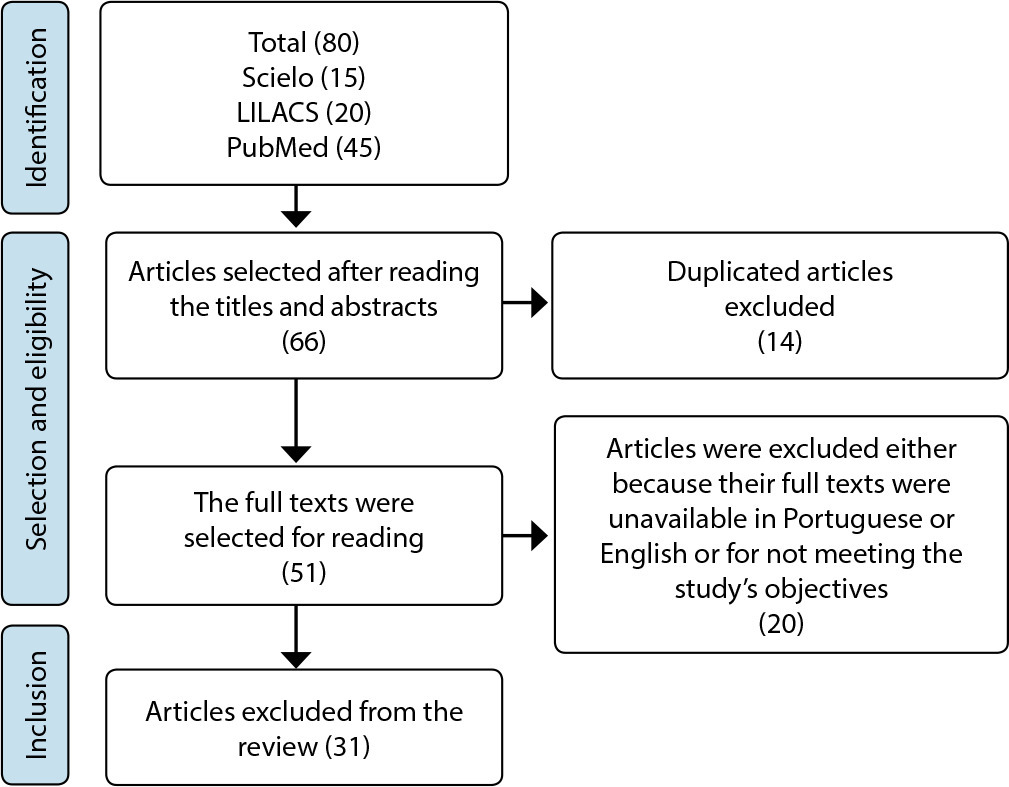
-
ORIGINAL ARTICLE10-17-2022
Factors associated with psychoactive substance use among professional truck drivers
Revista Brasileira de Enfermagem. 2022;75:e20210187
Abstract
ORIGINAL ARTICLEFactors associated with psychoactive substance use among professional truck drivers
Revista Brasileira de Enfermagem. 2022;75:e20210187
DOI 10.1590/0034-7167-2021-0187
Views0See moreABSTRACT
Objectives:
to identify factors associated with the use of psychoactive substances among professional truck drivers.
Methods:
cross-sectional study that investigated the use of at least one psychoactive substance and its association with sociodemographic, occupational, and health characteristics in 354 professional truck drivers. Researchers collected data through face-to-face interviews using forms. Multiple regression analyzes estimated prevalence ratios (PR) and respective 95% confidence intervals (95%CI).
Results:
lower family income (PR: 2.03; 95%CI: 1.08-3.83), symptoms of insomnia (PR: 2.18, 95%CI: 1.46-3.26), and long working hours (PR: 1.95, 95%CI: 1.30-2.92) independently associated with the use of at least one psychoactive substance.
Conclusions:
a set of sociodemographic, occupational, and health variables acts at distinct levels and is independently associated with the use of psychoactive substances among professional truck drivers.
-
ORIGINAL ARTICLE10-17-2022
Coping with the health condition from the perspective of people with HIV who abandoned treatment
Revista Brasileira de Enfermagem. 2022;75:e20210958
Abstract
ORIGINAL ARTICLECoping with the health condition from the perspective of people with HIV who abandoned treatment
Revista Brasileira de Enfermagem. 2022;75:e20210958
DOI 10.1590/0034-7167-2021-0958
Views0See moreABSTRACT
Objectives:
to understand how people living with HIV who have abandoned treatment face their health condition.
Methods:
a qualitative study, based on the Chronic Care Model theoretical precepts. Data were collected between April and August 2021, through interviews with 24 people registered in a specialized service in the Brazilian Midwest.
Results:
coping with the health condition included good and bad moments and is influenced by individual behaviors and the way in which the network was organized. Treatment abandonment was motivated by the absence of signs and symptoms, the way care is provided and medication side effects.
Final Considerations:
care actions focusing on behavior change and maintenance become necessary in order to favor continuity of treatment. Furthermore, the gaps identified in the way health services are organized are subject to intervention.
-
ORIGINAL ARTICLE10-17-2022
Ethics, COVID-19 and nursing vulnerability: analysis of photographs released by the media
Revista Brasileira de Enfermagem. 2022;75:e20210960
Abstract
ORIGINAL ARTICLEEthics, COVID-19 and nursing vulnerability: analysis of photographs released by the media
Revista Brasileira de Enfermagem. 2022;75:e20210960
DOI 10.1590/0034-7167-2021-0960
Views1See moreABSTRACT
Objectives:
to analyze nursing vulnerability through photos released by the media amidst the COVID-19 pandemic.
Methods:
a documentary study, with a qualitative approach. The object of analysis were photographic images selected between January 2020 and March 2021, published by the main news portals in countries such as Brazil, the United States, France, Spain, England and Germany. Thematic categorical analysis was the method of analysis used.
Results:
we found 74 photographs that portrayed nursing professionals in different work situations. It was possible to identify stigma and social devaluation about this class’s representation and professional attribution. Moreover, we found an underrepresentation of black professionals in Brazilian portals and the man as the prominent figure in the spaces of claims.
Final Considerations:
the photographs represented an important tool for the social analysis of nursing vulnerability, favoring the unveiling of situations that may go unnoticed by nursing and society.
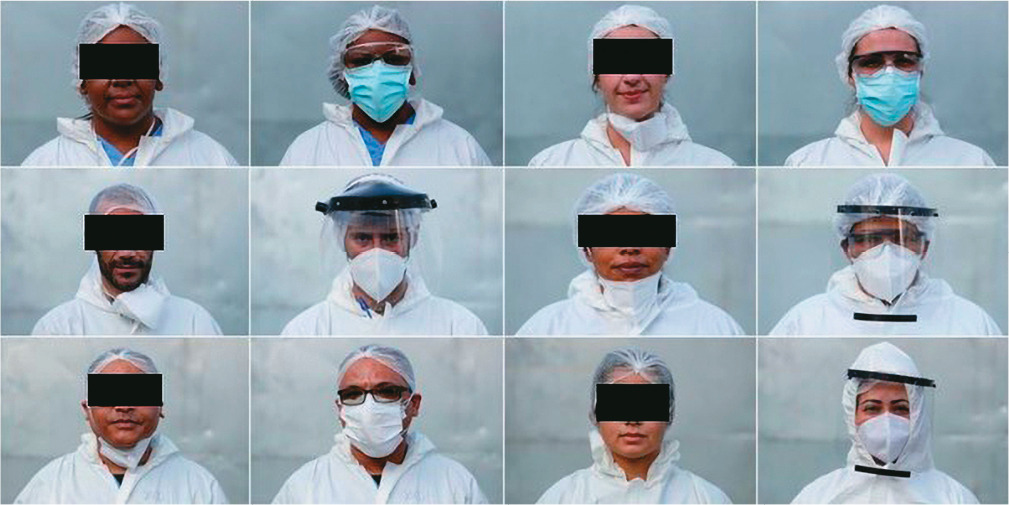
-
ORIGINAL ARTICLE10-17-2022
Association between rural workers’ sociodemographic and reproductive characteristics and their reproductive autonomy
Revista Brasileira de Enfermagem. 2022;75:e20210878
Abstract
ORIGINAL ARTICLEAssociation between rural workers’ sociodemographic and reproductive characteristics and their reproductive autonomy
Revista Brasileira de Enfermagem. 2022;75:e20210878
DOI 10.1590/0034-7167-2021-0878
Views0See moreABSTRACT
Objectives:
to verify the association between sociodemographic and reproductive characteristics with rural workers’ reproductive autonomy.
Methods:
a cross-sectional study, with a sample of 346 women and application of the Reproductive Autonomy Scale. Multinomial regression was performed to analyze associations between independent variables and outcomes.
Results:
in the analysis of subscales “Decision-making”, “My sexual partner or someone else such as a parent”, “Both me and my partner” and “Me”, women experienced greater reproductive autonomy in relation to their partners. For outcomes “Decision about which method to use”, “When to have a baby” or “About unplanned pregnancy”, the highest prevalence was for category “Me”, with statistically significant associations.
Conclusions:
the sociodemographic and reproductive characteristics among the most vulnerable women, in terms of the social, economic and cultural context in which they are inserted, may be associated with greater difficulties in exercising reproductive autonomy.
Search
Search in:
Nuvem de Tags
Enfermagem (930)Cuidados de Enfermagem (269)Atenção Primária à Saúde (239)Idoso (208)Educação em Enfermagem (151)Segurança do Paciente (150)Saúde Mental (145)Educação em Saúde (139)Estudos de Validação (131)Qualidade de Vida (104)Tecnologia Educacional (100)Promoção da Saúde (99)COVID-19 (91)Criança (91)Família (87)Enfermagem Pediátrica (86)Saúde do Trabalhador (86)Adolescente (85)Saúde Pública (82)Estudantes de Enfermagem (77)






